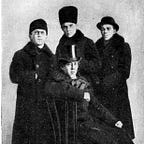No Love Lost: On Apathy as a Political/Social Tool
alt title: Nietzsche and Kierkegaard on Love: And Some Other Dumb Bitches
Many have imagined republics and principalities which have never been seen or known to exist in reality, for how we live is so far removed from how we ought to live, that he who abandons what is done for what ought to be done will rather bring about his ruin than his preservation.
- Nicolo Machiavelli
No good deed goes unpunished.
Preservation and Alienation — Identity is based on anchored checkpoints that validate the supporting rhythm that allows our own role to flourish within the rhythm we call existence.
For example, a 1950’s type of typical nuclear family would have a father that was expected to fulfill certain stereotypes. In terms of checkpoints, the stereotype is not always being validated. It’s only validated at checkpoints where expectations are met by everyone around.
When we’re alone, we operate with a function that validates everything within our own consciousness. When we’re with others, the validation is exposed to however many minds may be present to the extent that they are present.
The extension of each mind can’t be evaluated outright because each mind is a reaction to something that has already happened. The reaction can never be accounted for. Some people may appeal to science and say that behavior is predictable but that again depends on checkpoints for validation. The point is that there is no point to checkpoint because the thing doing the pointing is itself made up of the same process.
Others may say that this is a romanticization of the events. Why would/should poetics take precedence over math? I don’t know.
If we continue, however, thinking that each evaluation has within it a process of eternal reactions, we have to consciously talk about where do we draw the line?
Imagine talking to someone who seems to be “out of it.” Maybe they’re intoxicated. There’s two minds in the occasion. Lead by their own evaluation, we can’t know what this impaired person may go on to do. It’s likely within a wide range of possibilities, but also within the vicinity of “not good.”
Our own evaluation is infinite but we stop it within a practical context. Or an evaluation based on pragmatic outcomes. Dogma usually helps in establishing what these pragmatic outcomes are. Circling back to the stereotypical 1950’s nuclear family’s father.
The identity is established by a person performing certain actions that correlate with the continuation of a social cohesion through the shared culture. To break the rhythm, become discordant, is to not fulfill expectations. The feedback loop is felt when people would treat you differently. Depending on the context.
Nowadays, the epistemology that makes our society possible is based on an epistemology that is only validated via sharing certain cultural checkpoints.
These checkpoints open the door for communal opportunities.
The checkpoints are always partly based on own expression.
If we break the universe into two components, a receptive one and an expressive one, we understand our expressive role as possibly autonomous.
Universal reception, universal expression host our own individual reception and individual expression.
Our breaking from social cohesion by individual expression that delineates from the social checkpoints can lead to branching out and creating other checkpoints.
An example is pidgin languages. Some pidgin languages are seen as corruption of their “native” roots, but eventually earn the recognition of legitimacy.
Or Thales who found himself in one of the very first cosmopolitan areas and unified humans by creating myths grounded in reason that connected everyone, regardless of their diverse cultural origins.
Our own understanding becomes harder to theorize the more real they become. Our family and our neighbors fulfill some of these archetype but our consciousness can’t help but evaluate them as more than that. And this is where the extension becomes more individualized and tied to the biological process that underlies our are mental union. All theory is first possible by a grounding sympathy to our own life and the kind of life we live.
Here is where the question “why value poetics over math?” gains some traction. The sympathy is consciously validated by mathematical truths (from this branches out medicine, psychology, science, logic, reason, etc), but also poetic maxims that become unintelligible to math the more looked into.
The only validation is that the conclusion drawn from math or poems create extension of sympathy that becomes the continuation of the underlying rhythm that carries us all towards higher mental faculties.
From this, we can move towards Nietzsche’s and Kierkegaard’s take on love. Kierkegaard talking about unfulfilled love. A love towards nowhere. Not a continuation of expectation, but an idealization of reception. The love will never be received as one expects, but hopes the reverberation of its impact will dig down into everlasting change. Nietzsche’s love from a distance. In the virtual world, we grow disconnected into more nuance but our wish for universal resolution/receptive to our bare love without underlying political “self-interest.”
